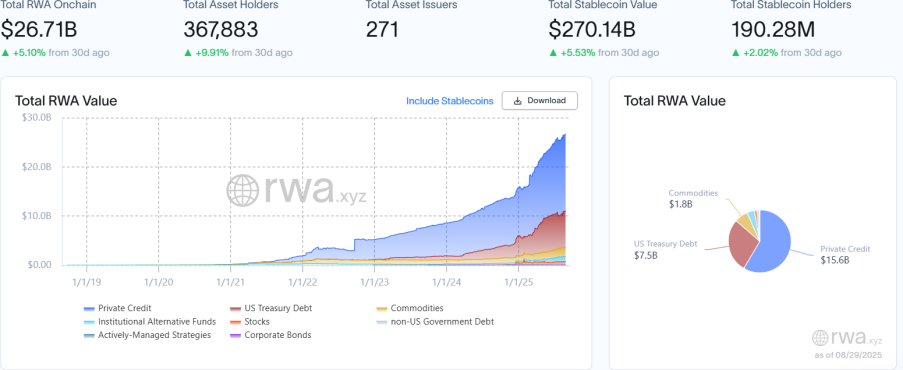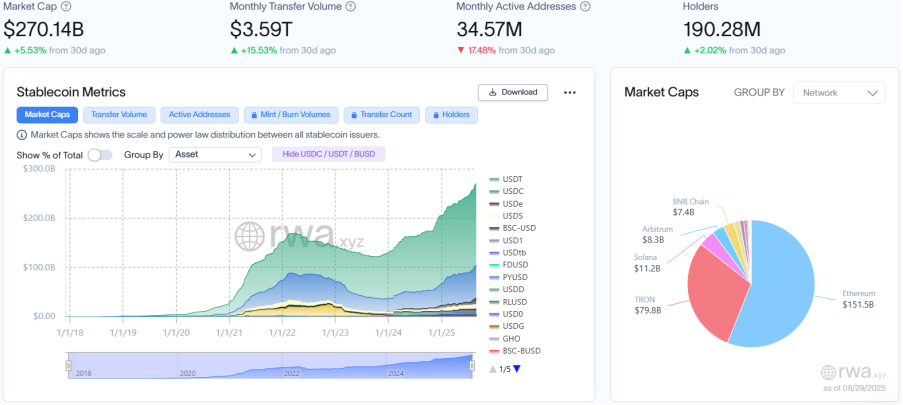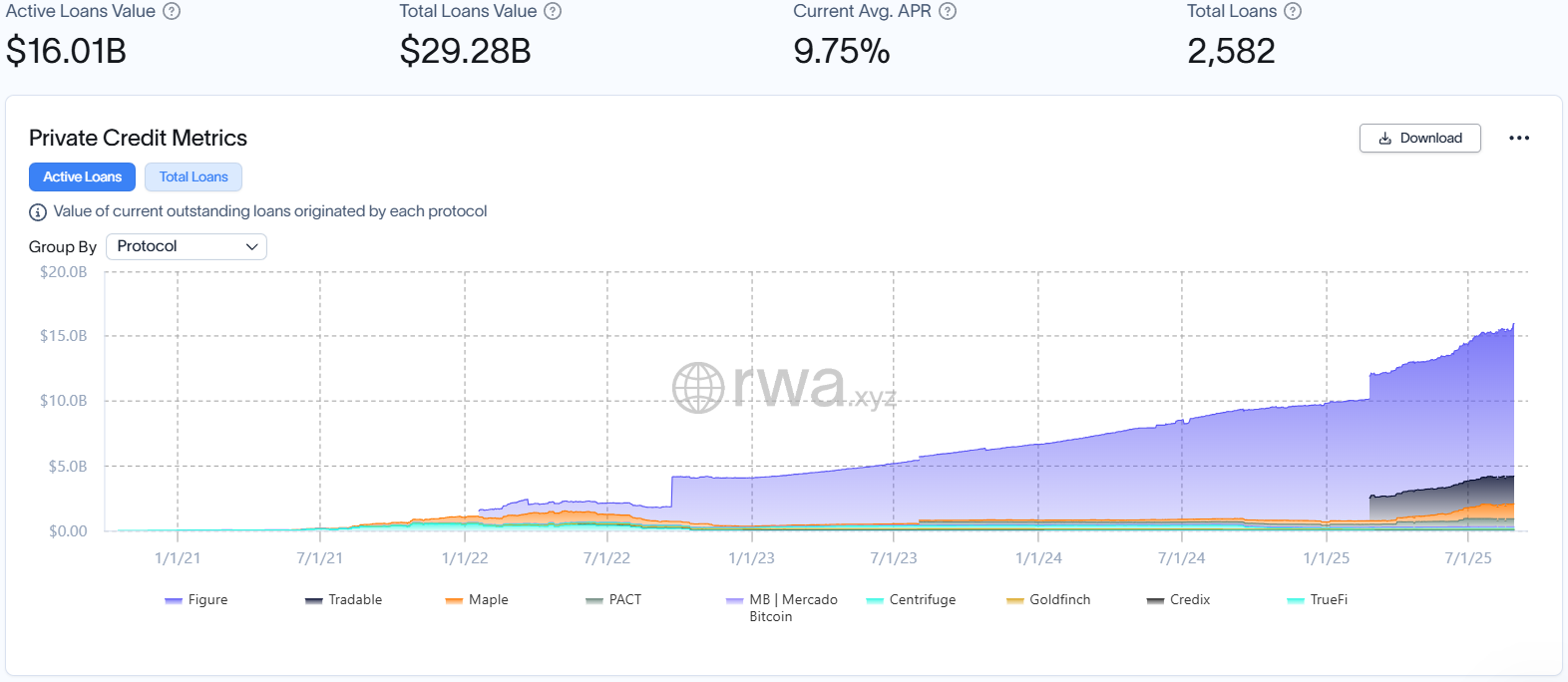Highlights of This Issue
This week's newsletter covers the statistical period from August 22 to August 28, 2025. This week, the total market capitalization of RWA on-chain increased by 5.10% compared to the previous month, with the number of holders rising by 9.91%. The total amount of outstanding private credit loans reached $16.01 billion, with an average interest rate as high as 9.75%, highlighting the yield attractiveness of the on-chain credit market. Regulatory developments continue to deepen, indicating that compliance and risk control remain focal points. Institutional layouts are becoming more diversified, with frequent actions from listed companies. At the project level, alternative assets such as carbon reduction assets and Thai government bonds (G-Token) are accelerating tokenization, indicating that RWA is rapidly penetrating from financial assets into the real economy, ESG, and government-level applications, with increasing ecological diversity and improving infrastructure.
Data Insights
RWA Sector Overview
According to the latest data from RWA.xyz, as of August 29, 2025, the total market capitalization of RWA on-chain is $26.71 billion, an increase of 5.10% compared to the same period last month, continuing a steady expansion trend. The total number of asset holders is approximately 367,900, up 9.91% from the same period last month, with the growth rate of asset holders exceeding that of the total market capitalization of RWA on-chain, reflecting increased participation from small and medium investors. The total number of asset issuers has increased to 271, indicating that new issuing institutions are accelerating the diversification of the ecosystem.

Stablecoin Market
The total market capitalization of stablecoins is $270.14 billion, an increase of 5.53% compared to the same period last month. The monthly transfer volume is $3.59 trillion, a significant increase of 15.53% compared to the same period last month. The total number of monthly active addresses is approximately 34.57 million, a sharp decrease of 17.48% compared to the same period last month. The total number of holders is approximately 190 million, a slight increase of 2.02% compared to the same period last month, with both figures showing a sharp divergence, indicating a drastic decline in retail trading willingness while the base of long-term holders expands. The leading stablecoins are USDT, USDC, and USDe, with USDT and USDC's market capitalizations increasing by 2.21% and 7.83%, respectively, while USDe's market capitalization surged by 57.62%.

Private Credit Market
The total amount of outstanding loans in the private credit market has reached $16.01 billion, accounting for approximately 54.7% of the historical cumulative issuance of $29.28 billion. The current average annualized interest rate is 9.75%, significantly higher than that of the traditional corporate bond market, reflecting the liquidity premium and risk pricing advantages of on-chain credit. The total number of loans is 2,582, with an average single loan size of approximately $6.2 million, confirming the institutional financing dominance. Figure is the protocol with the highest total outstanding loans and historical cumulative issuance, with amounts of $15.015 billion and $11.771 billion, respectively.

Regulatory News
According to Caixin, the Hong Kong Monetary Authority recently issued a circular confirming that it will fully implement new banking capital requirements based on the Basel Committee's standards for crypto asset regulation starting January 1, 2026.
Fei Si, a partner at King & Wood Mallesons and a lecturer at the University of Hong Kong's Faculty of Law, stated in an interview with Caixin that the new regulations set the risk weight for crypto asset exposures using unlicensed blockchain technology at a maximum of 1250%, meaning banks must hold capital against these crypto asset exposures at a ratio of at least 1:1. Such high regulatory capital requirements will lead many banks to be unwilling to hold such crypto assets.
World Federation of Exchanges Calls for Strict Action Against Mimicking Stock Tokens
According to Finance Feeds, the World Federation of Exchanges (WFE) has called on global regulators to address the risks posed by unregulated brokers and crypto asset trading platforms regarding stock tokenization. The organization has written to the U.S. Securities and Exchange Commission's cryptocurrency working group, the International Organization of Securities Commissions' fintech working group, and the European Securities and Markets Authority, emphasizing concerns about investor protection and market integrity. WFE pointed out that while these tokens mimic the performance of U.S. stocks, they often lack the shareholder rights and protections associated with traditional stocks, potentially leading to regulatory arbitrage, legal uncertainty, and a lack of transparency, undermining public confidence in regulated markets. Key issues include liquidity fragmentation, retail investor rights being compromised, and insufficient platform risk disclosures, as well as custody and legal recourse risks. WFE urges regulators to take four measures: apply existing regulations equally to tokenization and traditional instruments, ensure consistency in disclosure and settlement standards, enhance international regulatory coordination, and clarify the legal framework for ownership and custody.
Local Developments
Hong Kong-listed Company Shankai Holdings Issues Corporate Tokenized Notes Totaling $40 Million
According to Securities Times, Hong Kong-listed company Shankai Holdings announced the issuance of corporate tokenized notes totaling $40 million. This product is deployed on the HashKey Chain and aims to build "AI computing power + data assets." It will subsequently put the company's quality physical assets "on-chain." This corporate tokenized note is reportedly the first corporate note tokenization product in Hong Kong.
Fosun Wealth Holdings Becomes Distributor of Tokenized Structured Notes for DBS Bank
According to Jiemian News, Fosun Wealth Holdings has announced that it has become one of the distributors of tokenized structured notes for DBS Bank, Singapore's largest bank. The tokenized structured notes being distributed are participation notes linked to cryptocurrencies. They pay cash returns when digital asset prices rise while limiting downside risks.
According to Gelonghui, Chinese supply chain financial technology service provider Lianyi Rong (09959) has officially announced a strategic partnership with enterprise-level blockchain solution provider XRPL. The two parties will jointly promote the deployment of Lianyi Rong's global digital supply chain financial applications on the XRP Ledger mainnet and facilitate the large-scale implementation of this application. As a core aspect of this cooperation, Lianyi Rong will officially deploy its global digital supply chain financial application on the XRPL mainnet to support the circulation and cross-border settlement of digital assets in real trade contexts. In the future, both parties will explore deeper cooperation in areas such as stablecoins and supply chain financial innovation, RWA asset trading based on smart contracts, and the ecological integration of blockchain and AI in global trade finance scenarios, further expanding XRPL's technological boundaries in the field of enterprise-level real assets.
Project Progress
SBI Holdings and Startale Collaborate to Launch On-Chain Stock and Physical Asset Trading Platform
According to The Block, Japanese financial group SBI Holdings and blockchain infrastructure company Startale Group have announced the establishment of a joint venture to launch a platform that supports on-chain trading of stocks and physical assets around the clock. This platform will combine SBI's financial ecosystem with Startale's blockchain technology, providing features such as cross-border settlement, fragmented ownership, DeFi protocol integration, account abstraction, institutional custody, and real-time compliance monitoring. The two parties will establish two joint ventures, respectively responsible for technology development and brand business expansion. The launch date of the platform has not yet been announced.
Ondo Finance to Launch On-Chain U.S. Stock Trading Platform on September 3
Ondo Finance announced via Twitter that it will launch the on-chain U.S. stock trading platform Ondo Global Markets on the Ethereum network on September 3.
MANTRA to Launch First Compliant RWA Product: Pyse E-Bike Fleet
According to official news from MANTRA, its first compliant physical asset tokenization (RWA) product will soon be launched on the MANTRA Finance platform. This product is the Pyse E-Bike Fleet, compliant with VARA regulations.
Investors will be able to own a portion of the leasing income generated by commercial electric vehicle rentals operated by a top food and e-commerce company in the UAE, marking an important advancement for MANTRA in the RWA field.
VersaBank Announces Its U.S. Branch Launching Tokenized Deposit Pilot Project
According to PR Newswire, B2B digital bank and cybersecurity technology solution provider VersaBank announced that its wholly-owned subsidiary VersaBank USA has launched an internal pilot program for its USDVB (the U.S. version of its proprietary digital deposit receipt DDR) in the United States. The DDR is exclusively developed by VersaBank using its proprietary technology and represents tokenized deposits issued by the bank, in a highly encrypted 1:1 digital form, offering higher security, stability, and compliance compared to actual cash deposits and stablecoins.
Similar to the pilot project completed by the bank in Canada, the USDVB pilot project aims to demonstrate the functionality, security, and operational integrity of VersaBank USA's DDR in a U.S. dollar environment, ensuring compliance with U.S. banking regulations, including the Bank Secrecy Act (BSA) and the Office of Foreign Assets Control (OFAC).
Tokenization Platform Centrifuge Receives Investment from Republic Digital
According to Crowdfundinsider, Republic Digital has announced an investment in the tokenization platform Centrifuge, which focuses on financial products, further committing to digital assets and tokenization. Republic Digital did not disclose the specific scale of the investment, but it is said that the funds will be used to integrate regulated digital assets and decentralized infrastructure to facilitate the transfer, pooling, and liquidity of real-world assets (RWA). Republic Digital pointed out that currently only $24 billion of RWA has been tokenized, while the potential market size in asset management could reach $125 trillion.
MyStonks Platform Achieves Over $200 Million in 24-Hour Trading Volume
As of August 27, around 1 PM, the 24-hour trading volume on the MyStonks platform reached $209.11 million. Currently, the MyStonks platform has launched 179 RWA token assets, with 37,063 users. MyStonks is a decentralized digital asset trading platform that focuses on U.S. stock token assets and contract trading (supporting up to 20x leverage), utilizing blockchain technology to achieve efficient and transparent digital asset trading and management, promoting the digitization of traditional assets and enhancing liquidity.
KuCoin Becomes the First Global Crypto Exchange to Support Thailand's G-Token Issuance
KuCoin, in collaboration with KuCoin Thailand, XSpring Digital, Krungthai XSpring, and SIX Network, has officially become the first and only global cryptocurrency exchange to support Thailand's historic G-Token project.
G-Token is the world's first tokenized government bond issued by a sovereign nation's treasury and the first government bond listed on a digital asset exchange in Thailand. The project is led by the Thai Ministry of Finance, with KuCoin Thailand serving as the designated primary digital asset exchange responsible for technical development and listing, while KuCoin Global provides technical consulting, secondary market liquidity support, and international market expansion.
According to CoinDesk, Aave Labs has launched a new platform called Horizon, which aims to allow institutional borrowers to use tokenized versions of real-world assets (RWA) such as U.S. Treasury bonds as collateral to obtain stablecoins. At launch, institutions will be able to borrow Circle's USDC, Ripple's RLUSD, and Aave's GHO to exchange for a range of tokenized assets, including Superstate's short-term U.S. Treasury bonds and cryptocurrency holding funds, Circle's yield fund, and Centrifuge's tokenized Janus Henderson products. The platform is designed to provide short-term financing for RWA holdings to qualified investors and allows them to deploy yield strategies. The platform's setup combines both permissioned and permissionless features: collateral tokens embed issuer-level compliance checks, while the lending pool remains open and composable. Chainlink's oracle service provides real-time pricing data, starting with NAVLink, directly on-chain to provide the net asset value of tokenized funds to ensure loans are properly collateralized.
Launch partners include a range of asset issuers, including Ethena, OpenEden, Securitize, VanEck, Hamilton Lane, and WisdomTree, with plans to expand the selection of collateral to more tokenized assets.
Metafyed Completes $5.5 Million Financing for Asian RWA Tokenization Market
Metafyed has announced the successful completion of $5.5 million in financing to expand the tokenization of real-world assets (RWA) market. Investors include blockchain investors and venture DAOs such as Block Tides and Positive Venture DAO, with additional support from Cyberport Hong Kong, Draper, and the Stellar Development Foundation. Metafyed is committed to utilizing blockchain, smart contracts, and AI compliance scoring.
According to Cointelegraph, wealth tokenization platform Arx Veritas and infrastructure company Blubird have completed the tokenization of $32 billion in carbon reduction assets (ERA) through blockchain technology, equivalent to preventing 394 million tons of carbon dioxide emissions, setting a record in the digital asset tokenization industry. The tokenized assets include sealed oil wells and coal mines, achieving carbon reduction by preventing coal mining, transportation, combustion, and the pollution emissions from abandoned oil wells. This reduction is equivalent to the carbon emissions of 395 million round trips from New York to London or 986 billion miles driven by cars. Blubird stated that there is strong institutional demand for ESG-compliant tokenized assets, negotiating over $500 million in transactions and nearing completion of significant institutional purchases. This collaboration aims to establish new financing and tracking standards for sustainable finance.
Insights Highlights
How Much Do Traditional Enterprises Spend to Enter the RWA Market?
PANews Overview: This article delves into the high costs and real challenges faced by traditional enterprises (especially Hong Kong-listed companies) in laying out RWA (real-world asset tokenization). The core point indicates that RWA is not a "panacea" for everything that can be put on-chain; standardized, highly liquid, and competitively yielding assets (such as money market funds and U.S. Treasury bonds) are the ideal choices. The article clearly breaks down the cost structure of RWA projects for the first time: the cost of a single issuance is approximately 3-6 million RMB, with the largest expenditure being the broker channel fee (2-3 million), paid to licensed Hong Kong brokers for their credit endorsement and compliance services, referred to as the "trust premium"; other costs include legal compliance (100,000-200,000), technical on-chain costs (500,000-800,000), and fundraising costs (2%-5% of the raised amount). If a long-term layout is desired, the costs are even higher, requiring various financial licenses (such as VASP licenses costing over 10 million) and ongoing maintenance costs for audits, legal matters, etc. Additionally, project implementation faces three major ecological challenges: immature technological infrastructure (such as reliance on Chainlink oracles, which present single-point risks), a shortage of hybrid talents who understand both traditional finance and DeFi, and the lack of on-chain distribution channels in the Asia-Pacific region, leading to reliance on high-cost off-chain brokers. In summary, RWA is an "overlay" of traditional finance and blockchain, requiring careful assessment of the balance between business models, compliance, and technical implementation, and is by no means a low-cost financing shortcut.
Coolpad Group: How Can RWA Become a Breakthrough Path for an Established Company?
PANews Overview: This article uses the former mobile giant Coolpad Group as an example to analyze how a traditional enterprise can use RWA as a strategic transformation "breakthrough path." The core driving force is that Coolpad faces the dilemma of core business shrinkage and a market value that has long been below net assets, with its holdings of approximately HKD 3.15 billion in quality properties (such as Shenzhen Coolpad Building and Dongguan Songshan Lake Park) lacking liquidity and not being fully recognized by the market. RWA is seen as an innovative path that can release the value of these "sleeping assets" through blockchain technology by enabling asset fragmentation, global price discovery, and around-the-clock trading. However, this strategy faces significant challenges: cross-border legal risks (how to legally and effectively map mainland property rights to token holders through a Hong Kong SPV structure), core capability mismatches (mining experience does not equate to financial asset issuance and compliance capabilities), and a high dependence on Hong Kong's emerging and potentially changing regulatory environment. Coolpad's plan is to cautiously advance in phases: starting with feasibility studies in Q4 2025, gradually completing partner selection, technical development, and regulatory communication by 2026, and ultimately launching a pilot after obtaining approval. This is a typical case of a traditional enterprise using RWA for "strategic self-rescue," but its success depends on effectively addressing the complex risks mentioned above, which is far from simply telling a new story.
免责声明:本文章仅代表作者个人观点,不代表本平台的立场和观点。本文章仅供信息分享,不构成对任何人的任何投资建议。用户与作者之间的任何争议,与本平台无关。如网页中刊载的文章或图片涉及侵权,请提供相关的权利证明和身份证明发送邮件到support@aicoin.com,本平台相关工作人员将会进行核查。




